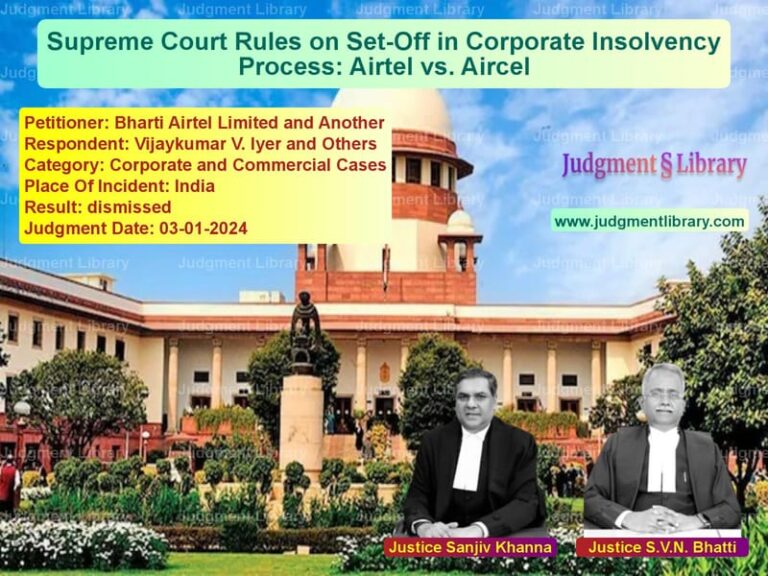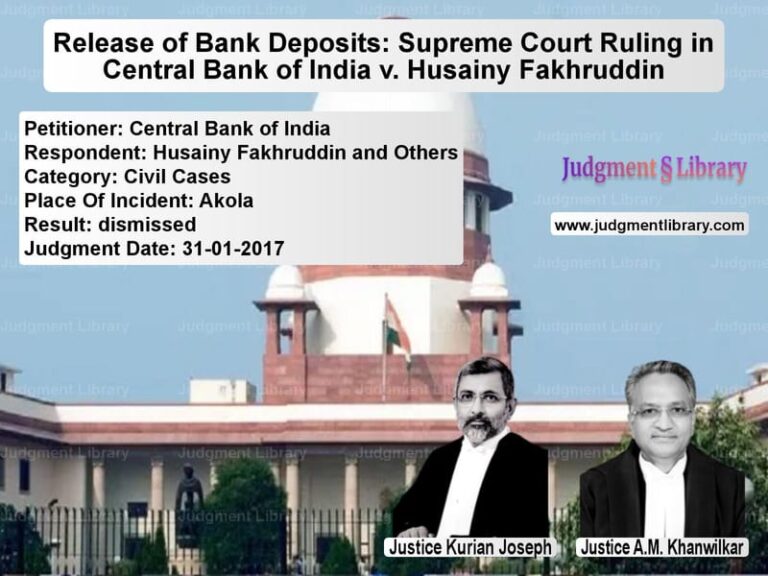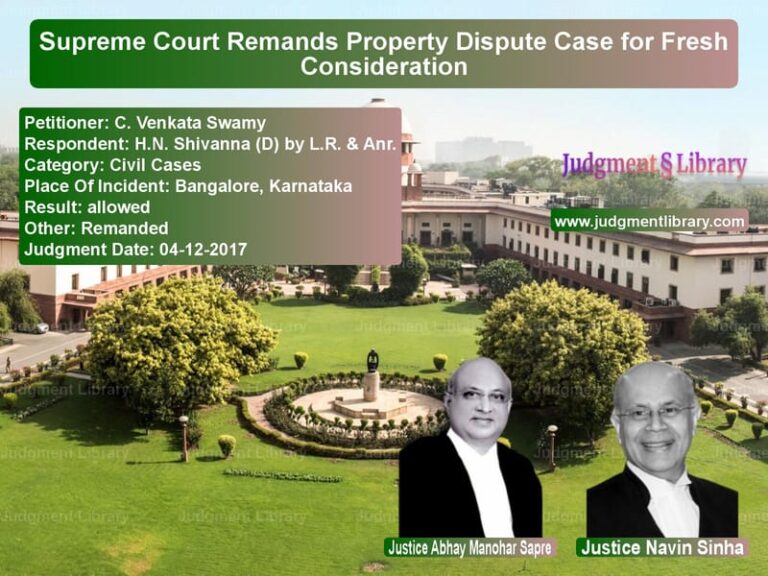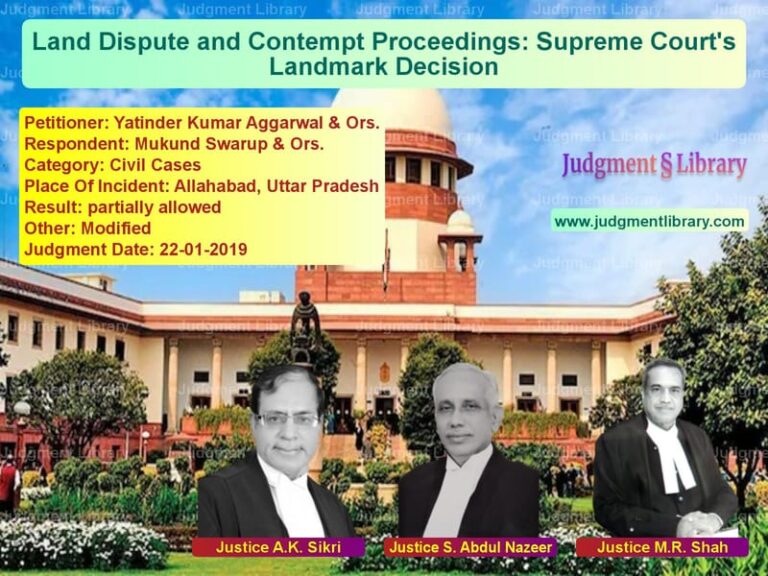Supreme Court Acquits Accused in Abetment of Suicide Case Due to Lack of Instigation
The case of Mohit Singhal & Anr. v. The State of Uttarakhand & Ors. revolves around a crucial question in criminal law—whether a demand for loan repayment and associated aggressive behavior can amount to abetment of suicide under Section 306 of the Indian Penal Code (IPC). The Supreme Court ultimately ruled in favor of the appellants, holding that the alleged actions did not constitute instigation to commit suicide.
Background of the Case
The case originated from an FIR registered at the instance of the third respondent, the widow of deceased Ashok Kumar. The prosecution alleged the following events:
- The third respondent had borrowed ₹40,000 from one Sandeep Bansal (also known as Sandeep Lala), the father of the first appellant.
- Subsequently, she borrowed another ₹60,000, out of which ₹15,000 was deducted as interest by Sandeep.
- On June 8, 2017, Sandeep called and verbally abused her for not repaying the loan. She sought two months’ time to repay.
- On June 15, 2017, the first appellant visited the shop where the deceased was present. He demanded repayment, verbally abused the deceased, and allegedly assaulted him with a belt.
- The first appellant also allegedly assaulted the third respondent and her mother-in-law, threatening to abduct her daughter.
- Sandeep had taken multiple cheques from the third respondent, one of which was dishonored. He issued a legal notice under Section 138 of the Negotiable Instruments Act, 1881 on June 27, 2017.
- The deceased, allegedly under stress from these incidents, wrote a suicide note on June 30, 2017, and died by suicide on July 4, 2017.
The appellants sought to quash the criminal proceedings, arguing that their actions did not constitute abetment under Section 306 of the IPC. However, the High Court rejected their plea, leading to this appeal before the Supreme Court.
Legal Issues Raised
The key legal questions before the Supreme Court were:
- Does a demand for loan repayment and alleged aggressive behavior constitute abetment of suicide under Section 306 IPC?
- Was there any direct instigation by the appellants to drive the deceased to suicide?
- Was there sufficient proximity between the alleged harassment and the act of suicide?
Arguments of the Appellants
The appellants, represented by their counsel, argued:
- The deceased was under stress due to his own financial liabilities and dishonored cheques, not because of any direct instigation from them.
- The alleged assault and threats occurred on June 15, 2017, while the suicide occurred on July 4, 2017. There was no act in close proximity to the suicide that could constitute abetment.
- Even if the allegations in the suicide note were taken at face value, they did not meet the legal threshold for abetment under Section 107 IPC (which defines abetment).
- The appellants had no “mens rea” (intention) to push the deceased towards suicide.
Arguments of the Respondents
The State of Uttarakhand and the widow of the deceased countered:
- The suicide note explicitly named the appellants and described the alleged harassment, establishing their role in abetting the suicide.
- The continuous pressure to repay the loan, coupled with verbal and physical abuse, created an unbearable situation for the deceased.
- The issue of whether the accused instigated the suicide should be determined through trial and not quashed at the preliminary stage.
Supreme Court’s Observations
1. Definition of Abetment Under Section 107 IPC
The Supreme Court analyzed the definition of “abetment” under Section 107 IPC, which includes:
- Instigation to commit suicide.
- Engagement in a conspiracy that leads to suicide.
- Intentional aiding of suicide.
The Court ruled that the appellants’ actions did not amount to “instigation” as required by Section 306 IPC.
2. Lack of Close Proximity Between Alleged Harassment and Suicide
The Court noted that the last alleged harassment took place on June 15, 2017, while the suicide occurred on July 4, 2017. There was no act by the appellants in “close proximity” to the suicide that could be seen as a direct trigger.
Read also: https://judgmentlibrary.com/supreme-court-upholds-high-courts-acquittal-in-27-year-old-murder-case/
3. Suicide Note Does Not Prove Instigation
The Court examined the suicide note and found that while it mentioned the appellants, it primarily described financial difficulties as the reason for the deceased’s distress. The note did not indicate any direct provocation or instigation by the appellants.
4. Mens Rea (Intent) Not Established
The Court ruled that for an abetment charge to stand, the accused must have an intention to push the victim to suicide. Here, the alleged threats and assault were related to loan repayment and did not indicate an intention to cause suicide.
5. Prosecution Would Amount to Abuse of Process
Since the basic ingredients of Section 306 IPC were not met, the Supreme Court concluded that continuing the prosecution would amount to “abuse of the process of law.”
Final Judgment
The Supreme Court ruled:
- The appellants did not instigate the deceased to commit suicide.
- Their actions, at most, were related to financial recovery but did not amount to “abetment” under Section 306 IPC.
- The case against them was quashed.
The Court observed:
“In the present case, taking the complaint of the third respondent and the contents of the suicide note as correct, it is impossible to conclude that the appellants instigated the deceased to commit suicide.”
Key Takeaways
1. Loan Recovery Efforts Do Not Constitute Abetment of Suicide
Aggressive demands for repayment do not automatically qualify as “instigation” under Section 306 IPC.
2. Close Proximity to Suicide Is Essential
For a conviction under Section 306 IPC, the act of instigation must occur in “close proximity” to the suicide.
3. Mens Rea (Intent) Is Crucial
There must be clear intent on the part of the accused to drive the victim to suicide.
4. A Suicide Note Alone Does Not Establish Abetment
Merely being named in a suicide note is insufficient unless there is direct evidence of provocation.
Conclusion
The Supreme Court’s ruling in this case reinforces the principle that criminal liability under Section 306 IPC must be backed by clear and proximate acts of instigation. The judgment protects individuals from wrongful prosecution based on financial disputes, ensuring that abetment of suicide is not misused as a blanket charge in debt recovery matters.
Petitioner Name: Mohit Singhal & Anr..Respondent Name: The State of Uttarakhand & Ors..Judgment By: Justice Abhay S. Oka, Justice Pankaj Mithal.Place Of Incident: Uttarakhand.Judgment Date: 30-11-2023.
Don’t miss out on the full details! Download the complete judgment in PDF format below and gain valuable insights instantly!
Download Judgment: mohit-singhal-&-anr.-vs-the-state-of-uttarak-supreme-court-of-india-judgment-dated-30-11-2023.pdf
Directly Download Judgment: Directly download this Judgment
See all petitions in Suicide Cases
See all petitions in Bail and Anticipatory Bail
See all petitions in Judgment by Abhay S. Oka
See all petitions in Judgment by Pankaj Mithal
See all petitions in allowed
See all petitions in Quashed
See all petitions in supreme court of India judgments November 2023
See all petitions in 2023 judgments
See all posts in Criminal Cases Category
See all allowed petitions in Criminal Cases Category
See all Dismissed petitions in Criminal Cases Category
See all partially allowed petitions in Criminal Cases Category







